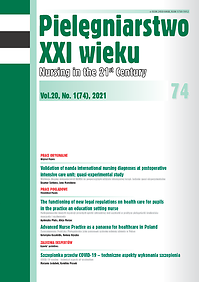Selected determinants of spirituality among nurses
DOI:
https://doi.org/10.2478/pielxxiw-2021-0004Keywords:
spirituality, nurses, dimensions of spiritualityAbstract
SELECTED DETERMINANTS OF SPIRITUALITY AMONG NURSES
Introduction. Spirituality has a multi-dimensional nature which influences the professional activities of nurses in a caring profession.
Aim. Identifying selected determinants of spirituality among nurses and their relationship with socio-demographic factors.
Material and methods. Research was conducted in 2018 on 144 nurses. All of the respondents were active in their profession. The research was made with diagnostic survey method using standardized research tools, including a Self-Description Questionnaire (SDQ), the Spiritual Transcendence Scale (STS), and the Brief Religious Coping (RCOPE) questionnaire, (BR).
Results. It was established that age and professional seniority positively correlate with Religious Attitude (SDQ), p<0.05; Transcendence Proper (STS), p<0.01; and with positive religious stress-coping strategies (BR), p<0.01. It shows that a declaration of relationship to faith positively correlates with the subscales of the questionnaire (SDQ), i.e. Religious Attitude (r=0.247, p<0.01), Ethical sensitivity (rho=0.230, p<0.01), and Harmony (r=0.218, p<0.05). Moreover, a strong correlation was confirmed with Transcendence Proper (STS), r=0.40, p<0.01, and with positive religious strategies for coping with stress (BR), r=0.505, p<0.01, and declared relationship to faith.
Conclusions. The dimensions of spirituality are significantly related to age, seniority, declaration of attitude to faith, and positive religious stress-coping strategies. Predictors of spirituality among nurses are place of residence, spiritual openness and negative religious stress-coping strategies.
References
1. Attard J, Baldacchino D, Camilleri L. Nurses’ and midwives acquisition of competency in spiritual care: A focus on education. Nurse Educ. Today. 2014; 34: 1460-1466.
2. Timmins F, McSherry W. Editorial - Spirituality: The Holy Grail of contemporary nursing practice. J. Nurs. Manag. 2012; 20: 951-957.
3. Timmins F, Murphy M, Caldeira S, et al. Developing Agreed and Accepted Understandings of Spirituality and Spiritual Care Concepts among Members of an Innovative Spirituality Interest Group in the Republic of Ireland. J. Relig. 2016; 7(30): 1-15.
4. Narayanasamy A. The puzzle of spirituality: A guide to practical assessment. Br. J. Nurs. 2004; 13: 1140-1145.
5. Puchalski Ch, Vitillio R, Hull SK, et al. Improving the spirituals dimension of whole person care: Reaching national and international consensus. J Palliat Med. 2014; 7: 642-656.
6. Hussain D. Spirituality, religion and health: reflections and issues. Europe’s J. Psychol. 2011; 1: 187-197.
7. Cone PH, Giske T. Nurses’ comfort level with spiritual assessment: a study among nurses working in diverse healthcare settings, J. Clin. Nurs. 2017; 26(19-20): 3125- 3136.
8. Keenan PM, MacDermott C. Prayer and Religion Irish Nurses Caring for an Intellectually Disabled Child Who Has Died. J. Relig. 2016; 7(148): 1-6.
9. Pargament KI. Religious methods of coping: Resources for the conservation and transformation of significance. [w:] Shafranske EP, red. Religion and the clinical practice of psychology. Washington DC: American Psychological Association; 1996, s. 215-223.
10. Pargament KI, Ano GG, Wachholtz AB. The Religious Dimension of Coping: Advances in Theory, Research, and Practice. [w:]. Paloutzian R.F, Park CL, red. Handbook of the psychology of religion and spirituality. New York: Guilford Press; 2005, s. 479-495.
11. Heszen-Niejodek I, Gruszczyńska E. Wymiar duchowy człowieka, jego znaczenie w psychologii zdrowia i jego pomiar. Prz. Psychol. 2004; 47(1): 15-31.
12. Piotrowski J, Skrzypińska K, Żemojtel-Piotrowska M. Skala transcendencji duchowej. Konstrukcja i walidacja. Rocz. Psychol. 2013; 16(3): 451-467.
13. Jarosz M. Skala Religijnego Radzenia Sobie – wersja skrócona (Brief RCOPE). [w:] Jarosz M, red. Psychologiczny pomiar religijności. Lublin. Towarzystwo Naukowe KUL; 2011, s. 293-316.
14. Piedmont R. Does spirituality represent the sixth factor of personality? Spiritual transcendence and the Five-Factor Model. J Pers. 1999; 67(6): 985-1013.
15. Pargament KI, Koenig HG, Perez LM. The many methods of religious coping: development and initial validation of the RCOPE. J Clin Psychol. 2000; 56(4): 519-543.
16. McSherry W, Ross L. Nursing. [w:]. Cobb M, Puchalski CM, Rumbold B, red. Textbook of Spirituality in Health Care. New York: Oxford University Press; 2012, s. 70-83.
17. McSherry W, Jamieson S. The qualitative findings from an online survey investigating nurses’ perceptions of spirituality and spiritual care. J. Clin. Nurs. 2013: 22: 3170- 3182.
18. Schep-Akkerman A, van Leeuwen R. Spirituele zorg: vanzelfsprekend, maar nietvanzelf (Spiritual care: obvious, but not natural). Tijdschrift voor Verpleegkundigen. 2009; 119: 34-39.
19. Pargament, KI, Koenig, HG, Tarakeshwar N, Hahn J. Religious coping methods a as predictors of psychological, physical, and spiritual outcomes among medically ill elderly patients: A two-year longitudinal study. J. Health Psychol. 2004; 9: 713-730.
20. Harrison MO, Koenig HG, Hays JC. The epidemiology of religious coping: A review of recent literature. (special issue: Religion and psychiatry). Int. Rev. Psychiatry. 2001; 13(2): 86-93.
21. Piedmont R. Does spirituality represent the sixth factor of personality? Spiritual transcendence and the Five-Factor Model. J. Personal. 1999; 67(6): 985-1013.
22. MacDonald D, Friedman H. Assessment of humanistic, transpersonal and spiritual constructs: State of the science. J. Humanist. Psychol. 2002; 42: 102-125.
23. Holland J, Neimeyer RA. Reducing the risk of burnout in end-of-life care settings: The role of daily spiritual experiences and training. Palliat Support Care. 2005; 3: 173-181.
24. Talik E, Szewczyk L. Ocena równoważności kulturowej religijnych strategii radzenia sobie ze stresem na podstawie adaptacji kwestionariusza RCOPE – Kennetha I. Pargamenta. Prz. Psychol. 2008; 51(4): 513-538.
Downloads
Published
Issue
Section
License
Copyright (c) 2021 Authors

This work is licensed under a Creative Commons Attribution-NonCommercial-NoDerivatives 4.0 International License.




